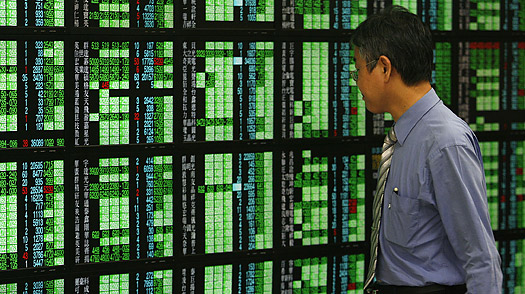Asian markets rose Monday as a further easing of lockdowns around the world offset another round of data highlighting the sharp economic pain being inflicted by the virus.
Traders also looked past a warning from the head of the Federal Reserve that a full recovery would likely not come until next year, warning that a vaccine would be needed to get things back to normal. With infection and death rates falling in some of the worst-hit countries, governments are slowly allowing businesses to reopen and people to venture out again, with top-tier football even returning in Germany — albeit in empty stadiums. And California’s governor said the state was 75 percent up and running, New York is also lifting the shutters in some regions, and Apple said almost 100 of its stores were now open.
“With the worst of the pandemic likely behind us, central bank supported equity markets are unlikely to re-test their lows,” said Seema Shah at Principal Global Investors. But she added that “while reopening momentum may well carry risk assets a bit higher over the near term, the tepid economic recovery and deep uncertainty over the virus outlook argue against a pivot to more risk-on positioning”.
Tokyo went into the break 0.7 percent higher, and Hong Kong, Shanghai and Seoul all rose 0.6 percent. Sydney gained more than one percent, Singapore and Wellington each added 0.7 percent and Jakarta edged up 0.2 percent.
“Good news for the market and the economy as a whole is that businesses worldwide are reopening, albeit in fits and starts,” said AxiCorp’s Stephen Innes. “While restaurants are opening at minimal capacity and mall traffic remains depressed, traffic congestion is beginning to tick significantly higher, suggesting that people feel confident in leaving their homes. Indeed, this is huge as the global recovery will fall 100 percent on the back of consumer confidence.”
Short downturn
The gains come despite a flurry of downbeat economic data, including Monday’s news that Japan had fallen into its first recession since 2015. While the January-March contraction was not as bad as expected, observers warned the current quarter would likely be much worse.
That followed a warning from Fed boss Jerome Powell that the US economy could “easily” collapse 20-30 percent this quarter, and unemployment could peak at 20 to 25 percent, though he added “it should be a much shorter downturn than you would associate with the 1930s” during the Great Depression. “Market reaction to these dire data releases what short lived, suggesting investors are now placing more value on forward looking indicators rather than real economic prints, which we all know have been negatively impacted by containment measures against COVID-19,” said Rodrigo Catril at National Australia Bank.
Still, uncertainty over the economic outlook continues to play in the background, while there are also concerns about brewing tensions between China and the United States which notched a little higher at the weekend when Washington ramped up sanctions on Huawei but cutting it off from global chipmakers.
Beijing responded by saying it would take “necessary measures” to protect the company and others. The slow reopenings continue to boost oil prices, with both main contracts up more than four percent and WTI — which last month fell below zero — breaking $30 for the first time since mid-March.
“There’s been a very sharp reaction by US producers in cutting output and that’s gone a long way in alleviating the stress on the system,” said Daniel Hynes of ANZ, said, adding he did not see prices going back below $20 unless there was another mass wave of infections.




